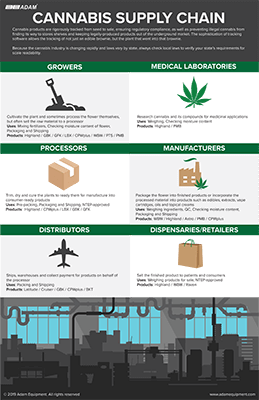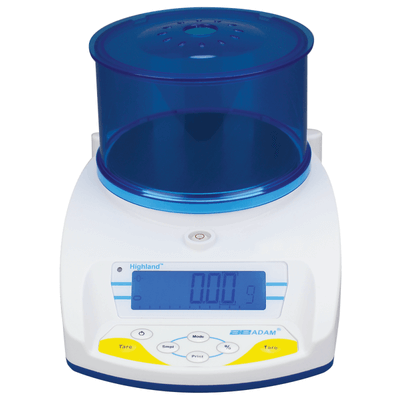
As the “green rush” continues and more states legalize marijuana for medical and/or recreational use, each segment of the industry, from growers to dispensaries, contends with scrutiny to document every stage along the cannabis plant’s journey from seed to consumer. A big part of that process is weighing the product. With the high price tag per ounce attached to such a commodity, it’s necessary to ensure that everyone is getting the correct amount and that’s where Adam balances come in!
Who are the players?
Key players in the cannabis distribution path:
- Growers
- Cultivate the plant and sometimes process the flower themselves but often sell the raw material to a processor, which also acts as a wholesaler.
- Processors
- Trim, dry and cure the plants to ready them for manufacture into consumer-ready products.
- Manufacturers
- Incorporate the processed material into products.
- Dispensaries
- Sell the finished product to patients and consumers.
At each level where consumer-destined cannabis is handled, the high-precision requirements for weighing are the same. Medical laboratories operate outside of the consumer-focused supply chain, but concentrate their efforts on researching all components of the cannabis plant to find their effects on the human body.
Click the infographic above to download!
What kind of weighing scales are required for selling medical cannabis?
All scales and balances used for selling cannabis to consumers need to be Class II, meaning they must display results from 1mg to 50mg (0.05g) and have 10,000 – 100,000 divisions, or better. (For reference, Class I units have more than 100,000 divisions.) Because dispensaries sell cannabis products in small amounts, readability of 0.01g is ideal to have. California’s scale requirements offer a representative look at the current state in the industry. Medical laboratories have a bit more leeway in terms of requirements since they don’t sell cannabis, but they often utilize balances with readability of 0.0001g, such as an .
To be used for sales, the balances must also be NTEP-approved/legal-for-trade. NTEP (or National Type Evaluation Program by the (National Institute of Standard and Technology) approval means that a scale or balance is legally approved in the U.S. for buying or selling goods by weight. As with other applications – such as biopharmaceuticals or jewelry – the small amounts of cannabis sold in most transactions require a high degree of readability to protect both the buyer and seller. Adam Equipment offers NTEP-approved models in its .
For growers, such readability isn’t critical during the production process when nothing is being sold, so a Class III bench scale, which offers a much higher capacity than a precision balance, would be a more appropriate choice for uses such as measuring yield. Once the cannabis is ready to move on to the next stage (such as to a wholesaler) where money will be exchanged, a legal-for-trade balance would be required.
Because the industry is changing rapidly and laws vary by state, always check local laws to verify your state’s requirements.




